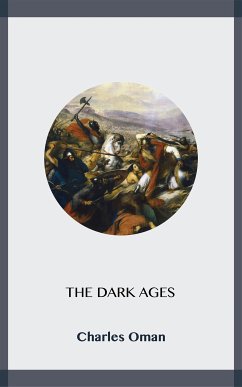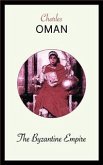In 476 A.D. the Western Roman Empire fell.
Romans would never again rule vast swathes of the western Mediterranean, instead these lands would fall to Vandals, Visigoths, Franks and various other tribes that Romans had formerly called ‘barbarians’.
The Roman Empire as the ancient world had known it had gone, this was now the Dark Ages.
Yet Charles Oman shines light upon this frequently forgotten period and explores how even though Rome had fallen and many changes had occurred there were also great continuities.
Although Rome may have fallen the Eastern Empire, centered at Constantinople, continued to thrive, in many ways continuing what the Roman Empire had always done since the days of Augustus, but also developing new judicial systems to govern its vast lands as well as encouraging new forms of art and architecture.
Even in the power vacuum that was left after 476 A.D. Western Europe did not descend completely into darkness, instead in the wake of Rome’s collapse many new powerful empires emerged that looked to Rome for support, most notably the Frankish Empire under Charlemagne.
Oman through the course of this incredibly detailed work uncovers fascinatingly vibrant figures from Theodoric the Great, who dominated Italy in the early sixth century, to Charles Martel, who halted the Islamic advance at the battle of Tours, thus demonstrating through the conflict of this period the foundations of modern Europe were laid.
Romans would never again rule vast swathes of the western Mediterranean, instead these lands would fall to Vandals, Visigoths, Franks and various other tribes that Romans had formerly called ‘barbarians’.
The Roman Empire as the ancient world had known it had gone, this was now the Dark Ages.
Yet Charles Oman shines light upon this frequently forgotten period and explores how even though Rome had fallen and many changes had occurred there were also great continuities.
Although Rome may have fallen the Eastern Empire, centered at Constantinople, continued to thrive, in many ways continuing what the Roman Empire had always done since the days of Augustus, but also developing new judicial systems to govern its vast lands as well as encouraging new forms of art and architecture.
Even in the power vacuum that was left after 476 A.D. Western Europe did not descend completely into darkness, instead in the wake of Rome’s collapse many new powerful empires emerged that looked to Rome for support, most notably the Frankish Empire under Charlemagne.
Oman through the course of this incredibly detailed work uncovers fascinatingly vibrant figures from Theodoric the Great, who dominated Italy in the early sixth century, to Charles Martel, who halted the Islamic advance at the battle of Tours, thus demonstrating through the conflict of this period the foundations of modern Europe were laid.









